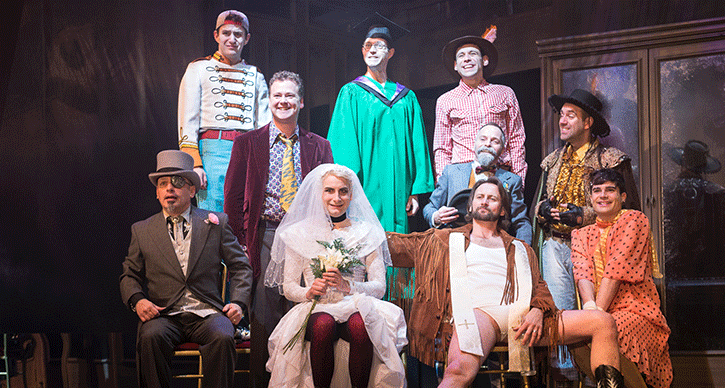Back in Town, and Loving It
Editor’s Note: Propeller performs Twelfth Night and The Taming of the Shrew in Ann Arbor, February 20-23. Leslie Stainton covered the company’s last visit to Ann Arbor in 2011 with Richard III. In this interview, Leslie chats with Propeller’s executive producer Caro McKay.

Photo: The Taming of The Shrew. Photo by Manual Harlan.
Caro McKay has been around the theater long enough to call herself “a dinosaur.” Now the executive producer of Propeller, she managed the English-language tour of the Peter Brook’s iconic Mahabarata back in the 1980s—a production students now learn about in performance studies classes, as McKay discovered to her surprise when she visited a class in U-M’s School of Music, Theatre, and Dance yesterday.
McKay’s been to Ann Arbor twice before—first with the venerable Royal Shakespeare Company nearly a decade ago, and then in 2011 with Propeller, the rambunctious, unpredictable, musically minded all-male troupe she launched a few years ago with the director Edward Hall. They’re all back in A2 this week with a pair of Shakespeare plays McKay says complement one another in dizzying ways—“because one is so harsh on love and marriage, and the other is so life-affirming about it.”
While crews were unpacking sets and focusing lights in the Power Center late yesterday afternoon, McKay took time to field a few questions by phone from her hotel room.
Leslie Stainton: What’s the best part about coming back to Ann Arbor?
Caro McKay: It’s the people. It really is. UMS is a fantastic host. And we’ve thoroughly enjoyed playing to the audiences. American audiences are very vocal. You let us know if you find it amusing or shocking. You tell us, and English audiences are rather restrained. It’s such a joy to have that interaction.
LS: What’s especially challenging about these two shows, Twelfth Night and Taming of the Shrew?
CM: Shrew is very funny but also very painful—there are very few kind words in that show. It’s the shorter, tighter, harsher of the two plays. For me it just passes in a moment, really. It’s riveting. And to follow up with Twelfth Night, which is a beautifully balanced bit of love with melancholy and humor—and also its own viciousness.
LS: Anything in particular we should be looking for in either play?
CM: Both shows are full of music. That’s very particular to Propeller, the way the actors are active musicians. I think there will be a lot for people to enjoy. I should just say very quietly that Act Two of Twelfth Night starts with a little bit of a tap dance routine.
LS: What about the sets?
CM: This time we’ve come back with a set that is shared between both productions, using wardrobes that you can walk into, out of, swing around. One wardrobe opens and has an organ. There’s an enormous great chandelier that is used in both plays. Twelfth Night can be quite black and white when we start in the beginning, in court, in this rather miserable little place … and then the color comes into it through the play.
LS: Are there certain moments where you’re especially curious to see how audiences react?
CM: I’m wondering how they will respond to the wedding in Shrew. So we’ll just wait and see what comments that might bring in. And to Petruchio and his servant. And I think the audience for Twelfth Night will enjoy the box tree scene—when Malvolio gets the letter to read. I think that is done in a rather different way. I’m very much looking forward to the comments. It was a rather lively debate last time.
What’s next in the Propeller pipeline?
CM: Our next two shows are Midsummer Night’s Dream and The Comedy of Errors. Popular titles. We’re building our audiences. Because a year after that, from the autumn of 2014 to 2015 we’re going to produce our history cycle. So we’re consolidating audiences, and then we’re going to sock ’em with a whole load of history. (Laughs.) Five plays, and we’ve decided that our version of the history cycle will include Edward III, which is attributed to Shakespeare.
LS: Any chance we’ll get to see it in Ann Arbor?
CM: We’d be so proud to. But I’m very very aware that Ann Arbor has had the RSC history plays! We would be only too proud—we love coming here already.






